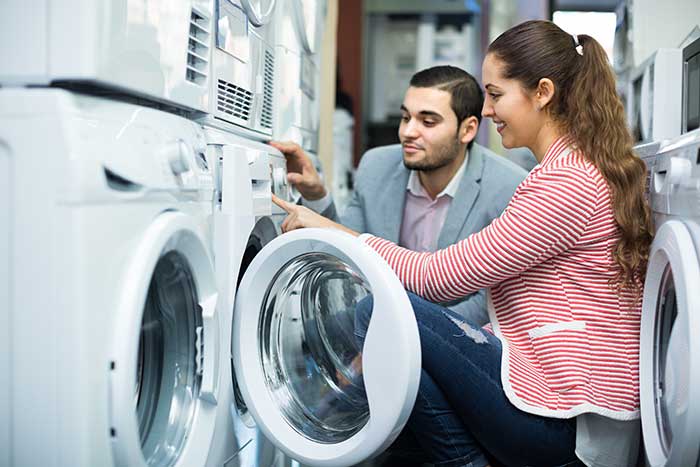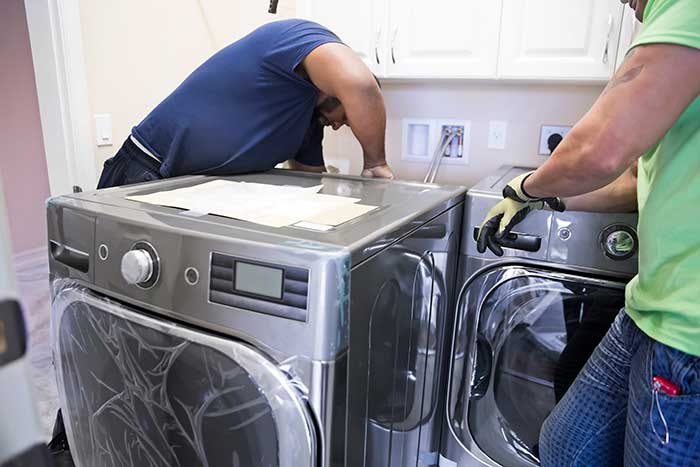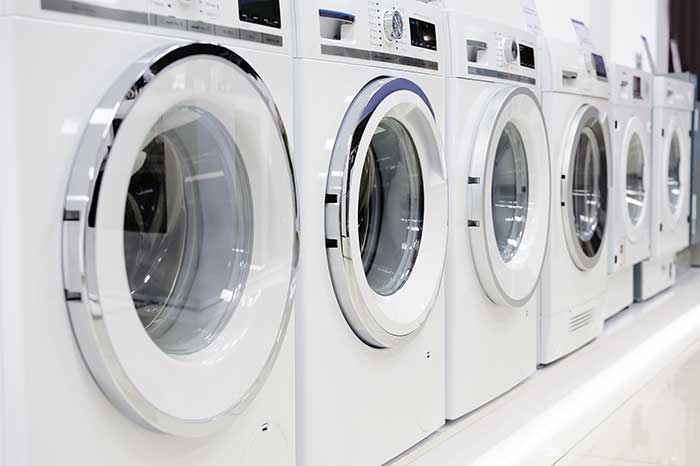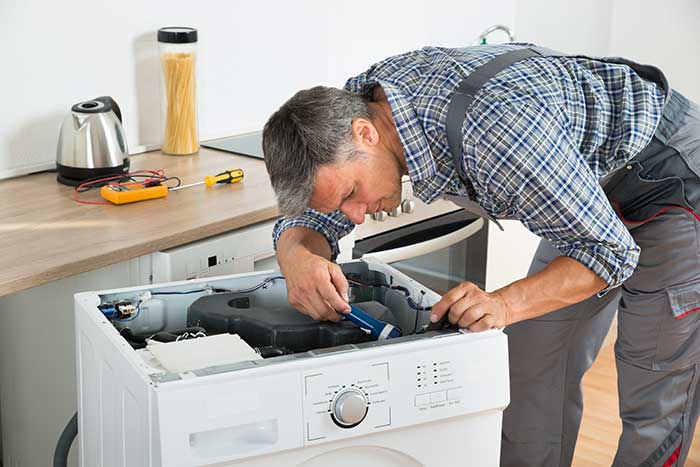Washer and Dryers
General Guidelines
If you’ve started shopping for new laundry equipment lately, I’m sure you’ve realized that these are not your mother’s washers and dryers anymore! Washing machines and dryers have become much more efficient over the past few years, but many have also become more complicated. The choices can be downright overwhelming.
Did you know that a typical family does about 400 loads of laundry a year? That’s a lot of laundry and a lot of time. Don’t let laundry put a wrinkle in your day. It’s well worth your time to research and find the washer and dryer that best meets your needs.

Washing Machines
Washing machines fall into two main categories, the more traditional top loading machines and the more efficient and stylish front loaders. Remember to bring accurate measurements of the space you have available, and to keep in mind the type of space you plan to keep your laundry units. How important is noise level, efficiency, and attractiveness in the space you have available? What kind of clothes will you be laundering? All of these considerations should be taken into account while you’re shopping for your new washer and dryer.
Top Loading Washers
Traditional top-loading washing machines are available in a wide assortment of models, price ranges and styles. Most top loading machines first fill the tub with enough water to cover the clothing, and then agitate the contents to get the clothing clean. Instead of agitating fabrics to get them clean, some top loading washers use a wash plate. Wash plates moves them through a shower of concentrated detergent and water. Without the friction caused by the agitator, the wash plates are able to clean fabrics more gently and keep your clothes looking new for longer.
Generally, top-loading washers are less expensive to purchase than front-loading machines, but are more expensive to operate because they use more water and electricity. As most things go in life, top loading washing machines trade one benefit for another, generally costing you less up front but more throughout their lifespan.
Front Loading Washers
Front loading washers deliver excellent overall performance. Typically, front-loaders use less water – from one-third to one-half the amount that top-loaders require. They do not have agitators and instead clothes are cleaned through a tumbling action which is gentler on fabrics. Because less water is used, less gas or electricity is required to heat the water. These machines have faster spin cycles, therefore clothes get wrung out more completely, reducing the cost of running a clothes dryer. In just about every way, front loading machines are more energy efficient. They use less electricity or gas, water and detergent, and faster spin cycles reduce the energy and time required to dry them. When you consider energy, water savings and the increased life of your clothing, front loading washers usually pay for themselves as the years go by.

Dryers
Dryers consist of a large, heated tumbler that vents moisture out through a dryer vent as it dries your clothes. The size of the drum capacity will determine if you can dry large items such as comforters or quilts. Most dyers come with a moisture sensor which regulates the interior temperature. This allows the dryer to gradually decrease the heat and energy used over the course of the drying cycle and can add years to the life of your new machine.
An efficient washer deserves an equally efficient dryer. Nowadays, dryers come with a all kinds of extra convenient features, including the ability to monitor the dryer progress on your computer, antibacterial drying cycle designed to eliminate bacteria in sheets, towels etc., and a no-tumble cycle which can dry items on a rack.

Washer / Dryers Combinations
A washer dryer combination may be a very useful item if you are short on space. However the smaller size also means smaller washing and drying capacity. A combination unit may be a wise choice if you are a 1-2 person household, or if space dictates the need for a smaller unit. Washer/dryers are very heavy, especially when they are full of water, and they can vibrate when they run. Make sure you can place them on a solid floor and most people usually prefer to have them separated from their living area.

A Special Note on Self-Installation
Thinking about saving some money by installing your new washer yourself? Stop!!
Washers are expensive and complicated appliances. They are very heavy, require specialized tools and can have complicated connections with your home’s plumbing, electrical, and gas systems. Improper installation can result in broken appliances, invalidated warranties, damage to your home’s floors, surfaces and injuries to yourself. Not to mention that you’ll need to find a way to get your washer home without damaging it and what will you do with your old one when you’re done?
Please consult professionals to make sure your appliance is installed safely and correctly. If you want to get the most out of your investment, have it installed by an expert. Installation is usually very inexpensive and even small mistakes made while installing it yourself can cost you big bucks in the future. Save yourself! Let us, true experts, install your new washing machine.
Gas or Electric?
While the connections you have in your laundry room will probably dictate which style you use, consider that gas dryers cost a bit more to begin with than the comparable electric model. But in most areas, gas dryers will cost less to run over their lifetime.
Gas appliances require the professional installation of a gas line and hookup. These units should also be professionally installed, as incorrect installation of gas appliances can decrease the life of your appliance, damage the appliance and be very dangerous to your home and family.
The Sweet Sound of Silence
Washers and dryers can vary in their noise production, which can have a large impact on your family if your laundry room is connected to a commonly used gathering area. If a noisy washer or dryer will interfere with your evening time together, consider a model that has extra noise reduction features. Delayed start features allow you to set a time to run your washer or dryer later in the day. This is very useful if you want to set times when noise will not disturb you or energy costs are lower.
To Warranty or Not to Warranty?
Washing involve lots of water and lots of electricity working side by side, which we all know can lead to a dangerous and destructive situation should something go wrong. Misbehaving washing machine can cause laundry room floods and only experts should attempt to deal with electrical matters when water is involved. Because of this, repairs to your washing machine can be very expensive.
On the other hand, extended warranties are usually very inexpensive and can therefore save you thousands in the future. It’s simple and inexpensive to purchase extended warranties and one of the smartest ways to protect your investment.
If you can spare a few thousand dollars without batting an eyelash for a new one should it break tomorrow and destroy your floors along with it, don’t bother buying a warranty. But if you’re like most of us, protect yourself by purchasing inexpensive extended warranties when you buy a new appliance and save yourself big money in the long run.
